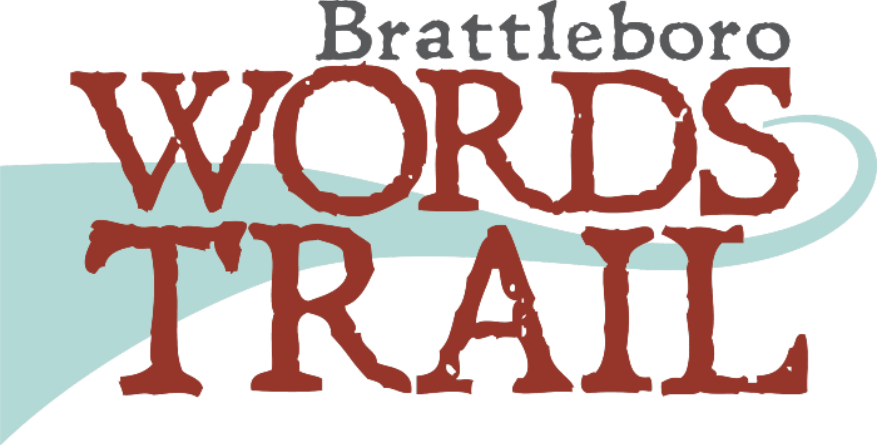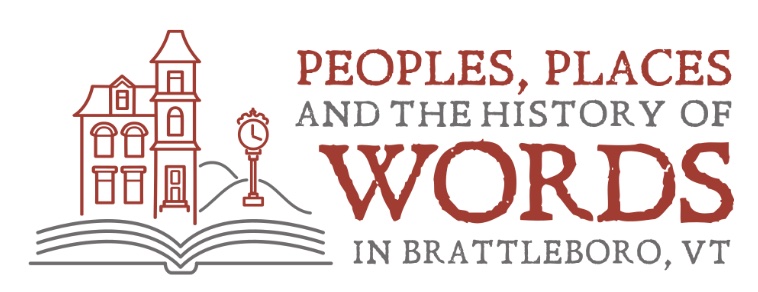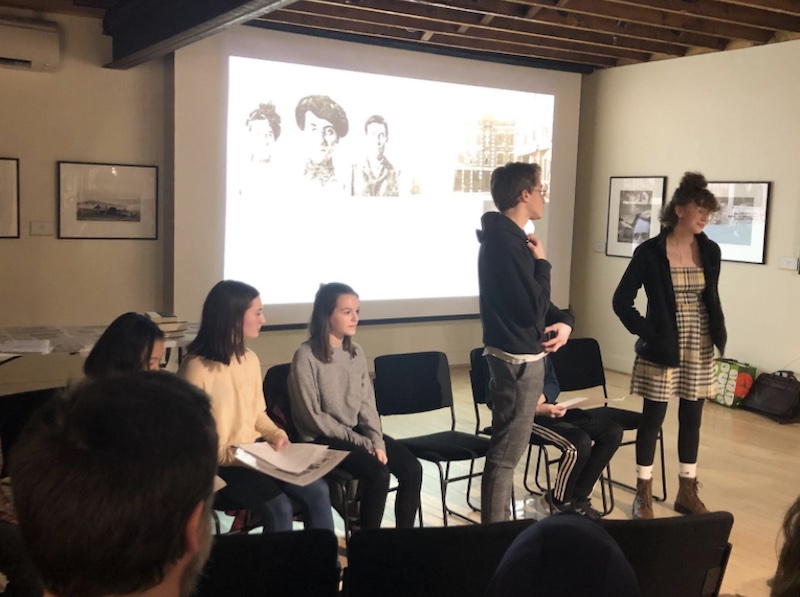 In December 2016, a new National Endowment for the Humanities (NEH) ‘Creating Humanities Communities’ grant was announced to stimulate inter-organizational collaboration on shared humanities projects in rural states. That call for proposals provoked Lissa Weinmann, a local writer and entrepreneur who had recently opened 118 Elliot, a gallery and community space on the site of one of the old watercures in Downtown Brattleboro, to email 40 heads of various groups in town to invite them to gather at 118 Elliot to brainstorm about what such a project, centered on Brattleboro, might look like.
In December 2016, a new National Endowment for the Humanities (NEH) ‘Creating Humanities Communities’ grant was announced to stimulate inter-organizational collaboration on shared humanities projects in rural states. That call for proposals provoked Lissa Weinmann, a local writer and entrepreneur who had recently opened 118 Elliot, a gallery and community space on the site of one of the old watercures in Downtown Brattleboro, to email 40 heads of various groups in town to invite them to gather at 118 Elliot to brainstorm about what such a project, centered on Brattleboro, might look like.
That brainstorming session attracted a diverse group of people, many of whom had never met. They collectively envisioned shared work that would highlight the Brattleboro area’s unique but little known tradition of writing, printing, publishing with a dash of storytelling and creative innovation thrown in. All expressed a commitment to highlight the role of previously under-represented voices as well as the land itself in this exploration.
This place-based focus was fed especially through the participation of William Edelglass, PhD, a professor of philosophy at (then) Marlboro College. He imbued the effort with a sturdy philosophical foundation around the meaning of ‘place.’ Rich Holschuh, a local representative of the Elnu Abenaki, and Curtiss Reed, founder of the Vermont African American Heritage Trail, also initially helped shape the thinking underpinning the work.
The Brattleboro Historical Society’s Joe Rivers brought a profound historical understanding of the town as well as pioneering audio storytelling work he developed as a teacher in ‘Draco Social Studies’ at Brattleboro Area Middle School. Sandy Rouse, founder of the Brattleboro Literary Festival, brought ideas about what people attending the popular annual festival wanted to see and do while in town. People like Mary Ide, Stephanie Green and Arlene Distler brought a long simmering desire to produce a book about Brattleboro’s unique legacy of words with research and contributions from local authors.
The group envisioned many voices creatively telling audio stories attached to places for a ‘deep mapping’ over time. They bet such activities would nurture a shared ‘pride of place’ and create new relationships by bringing community members and students together with scholars and experts to help research and illuminate these stories, while harnessing the unique and abundant artistic talent the area has to offer.
Five local groups were the ‘official’ maximum five partners named in the NEH Project: the Brattleboro Literary Festival (Sandy Rouse, Jerry Carbone), the Brattleboro Historical Society (Joe Rivers, Reg Martell), Brooks Memorial Library (Starr LaTronica, Jeanne Walsh), Write Action (Arlene Distler, Rolf Parker-Houghton) and Marlboro College (William Edelglass PhD). Marlboro College was the sole organization with the necessary administrative structure to manage a federal grant. It shuttered in 2020 in the middle of the Project but maintained administrative oversight to the Project’s completion.
The original NEH proposal, entitled “People, Places and History of Words in Brattleboro Vermont’ written by Edelglass PhD and Weinmann with input from partners, secured the four-year 1:1 NEH matching grant for the work beginning in Fall of 2017. Weinmann was elected director of what would become better known as the Brattleboro Words Project.

The original Brattleboro Words Project logo created by local graphic artist Mike Kelley
A core 16-person Leadership Team met monthly for the next three years. Many other groups, such as the Brattleboro Museum & Art Center, the Landmark Trust, the local school district etc would partner with the Project along the way.
Sponsorship and Support
The first individual contribution to begin the NEH ‘match’ came from Mara Williams, then curator of the Brattleboro Museum & Art Center. Many individual donors, thanked on our ‘Community Participants’ page include, in order of commitment: the National Endowment for the Humanities, the Windham Foundation, the Thompson Trust, 118 Elliot, Guilford Sound (David Snyder & Sara Coffey), the Vermont Arts Council Digital Capacity Grant, the Crosby-Gannett Fund, the New Hampshire Community Foundation’s Putnam Foundation, the Dunham-Mason Fund, the Vermont Humanities Council, the Marlboro Town Committee, the New England Grassroots Fund, Edward Jones, Friends of Brooks Memorial Library,Brattleboro Savings & Loan and many other businesses and individuals listed on the BrattleboroWords.org website, as well as literally thousands of in-kind hours contributed by scores of community members.
“I want to congratulate everyone involved in the launch of the Brattleboro Words Trail and the Print Town book that celebrate the rich literary legacy of the region.I learned the importance and the majesty of words at a very early age, growing up with parents who published a local newspaper and ran a family print shop. So I’m especially proud to support the good work of the National Endowment for the Humanities, and the Brattleboro Words Trail is proof of how an entire community can be lifted with the help of NEH investments.” – Vermont U.S. Senator Patrick Leahy
The Fruits of the Project
That initial phase of the Project was successfully completed in December 2020 when the Trail and a companion book were first released to the public. The book, entitled Print Town: Brattleboro’s Legacy of Words was published by the Vermont Historical Society. Print Town won the 2022 Indie Next Generation Award for Best Overall Design-Nonfiction and was also a finalist in the Historical Nonfiction Award category, given by the Independent Book Publishing Group, Inc.
The Trail itself has also won regional and national awards, including an ‘Award of Excellence’ from the American Association for State and Local History and the Vermont Historical Society’s 2021 Hathaway Prize for best state history Project. Perhaps those two grafs could be sideboxes or something right there?
As then coordinator of the Downtown Brattleboro Alliance, Jen Austin had joined the team early on and was responsible for its first grant, an Edward Jones Downtown Placemaking Grant administered by the DBA, which funded the Project’s first exhibit. Austin was later hired as Project Executive/Creative Director (June 2019 to January 2021) overseeing map creation, coordinating the book committee and overall administration.
The Project commissioned Brattleboro artist Cynthia Parker-Houghton to create a physical companion map for the online Brattleboro Words Trail stories. Cynthia used sgraffito, a ceramic carving technique she honed as lead designer at Natalie Blake Studios, to create beautiful murals that form the basis for the printed maps found around Brattleboro and surrounding towns. These murals were first exhibited at the Brattleboro Museum & Art Center then moved to 118 Elliot in April 2021 where they will stay until they anchor a permanent exhibit featured on the outside wall of the new Amtrak Station scheduled to be opened in Fall 2024.
Thousands of copies of the Brattleboro Words Trail printed maps have been distributed free of charge at various locations around town and are now available as downloads from this site.
A Plethora of Public Events
The Project has produced 28 monthly Roundtable Discussions on the people and places it studied and mounted seven distinct exhibitions at 118 Elliot, Brooks Memorial Library, Brattleboro Museum and Art Center and in MILES, a ‘Mobile Interactive Literary Exhibition Space’ created especially for the Project.
MILES hosted the Brattleboro Words Project’s first exhibit “Lucy Speaks” about Lucy Terry Prince, the nation’s first known African American poet and a Brattleboro-area resident, as a pop-up on Main Street during the 2017 Brattleboro Literary Festival.
We led ten free audio storytelling workshops in schools and libraries, often in conjunction with the Vermont Folklife Center.
Supporting Multi-faceted Learning for Teachers & Students at Area Public Schools
The Project shared Joe River’s audio-making with students model with eight area public schools over the course of its work, including at the Chesterfield School in New Hampshire. Thanks to a generous initial donation from Guilford Sound (which would later go on to master all Words Trail audio segments) the Project gifted digital audio sets to these schools and two to Brooks Memorial Library where a ‘sound booth’ was built for community members who wanted to record in a quiet place with equipment they could borrow from the library.. We also offered continuing learning credits to teachers for participating in audio-storytelling workshops certified by Marlboro College. Teachers loved how learning could be enhanced by the Project’s approach to history, writing and the technical aspects of audio creation.

January 2020 Students as Storytellers with Brattleboro Area Middle School Students
The Project initiated and worked with the state of Vermont to place three state historic markers recognizing prominent Vermont women up to 2022.
It placed a marker for Mary Wilkins Freeman working with the West Brattleboro community at the West Brattleboro Common and initiated Governor Phil Scott recognizing a state “Mary Wilkins Freeman Day’ in October, 2019.
It placed a historic marker for Jody Williams at her alma mater the Green Street School in October 2020 and arranged for Williams and her family to visit students at the Green Street School.
It placed a historic marker for the Prince family including Lucy Terry Prince at the Vermont State Welcome Center in Guilford in October 2021 and initiated, with the help of State Rep. for Guilford Sara Coffey, a legislative proclamation recognizing Lucy in the same year. The Project will continue working with the state to place new and animate existing historic markers.
‘Mainstreaming’ Abenaki Place Names and Presence
From the very start, the Project worked with Elnu Abenaki representative Rich Holschuh to prioritize recognition of Abenaki presence and names for things – as evidenced by the equal weight given Abenaki and colonist names of places on Project maps – as a way of expanding awareness of native past and present contributions and being.
From day one, The Common Pot: The Recovery of Native Space in the Northeast and Our Beloved Kin: A New History of King Philip’s War by Professor Lisa Brooks were fundamental guides to the work.
The Project helped stimulate placement of a marker recognizing Indigenous contributions at the Retreat Farm edge of the flooded ‘meadows’ where rare petroglyphs were submerged and later re-discovered by local diver Annette Spaulding. Please see the ‘Reclaiming Abenaki Place Name ‘Wantastegok’ at Retreat Farm’ video produced by Donna Blackney for the Brattleboro Words Project about the unveiling as well as the audio stories accompanying the marker at the Retreat Farm site.
Reclaiming Abenaki Placename ‘Wantastegok’ at Retreat Farm from D Blackney on Vimeo.
The Project also raised the profile of the author of the first Native American autobiography published in the US – Colrain MA-born William Apess – through the dedicated work of Professor Drew Lopenzina and continues to help expand Apess-awareness through its everyday work.
Raising the National Profile of Brattleboro as a Unique Literary Destination
The Project helped focus serious national attention on the Brattleboro area as a vibrant place to live, work and play with Trail citations in numerous national media including the USA Today, Forbes and the National Endowment for the Humanities international magazine HUMANITIES. Attracting tourism, weaving the disparate threads of what makes this area special and presenting it elegantly to the world, while deepening locals’ experience and appreciation of ‘home’, were the goals set forth and accomplished through this work.
“In harnessing its community’s creativity to tell the diverse and entertaining stories that make this town a nationally significant literary hub, the Brattleboro Words Trail is an exceptional resource and attraction for tourists and locals alike, offering multiple destinations around an intriguing central theme for those who seek a unique Vermont experience.” – Commissioner of the Vermont Department of Tourism and Marketing Heather Pelham
Project Work Continues To Grow Through Community Participation
Through a dedicated Advisory Team within fiscal sponsor Vermont Folklife Center, the Project continues to encourage community participation, connecting students and community members to the Brattleboro area’s strong literary legacy and present reality by making new audio stories attached to new places designated on the growing ceramic mural maps, developing a permanent exhibit at the new Amtrak Station (Fall 2024), a new Brattleboro Words Trail Podcast, Shanta Lee’s expanding connections to the state-wide African American Heritage Trail, marketing the Trail widely especially through Weinmann’s continued outreach and as an active member of Brattleboro’s Community Marketing Initiative, and developing potential classes and workshops sharing the Brattleboro Words Project model for community engagement with high schools and colleges, and other Words-related events and work that will continue to develop over time.